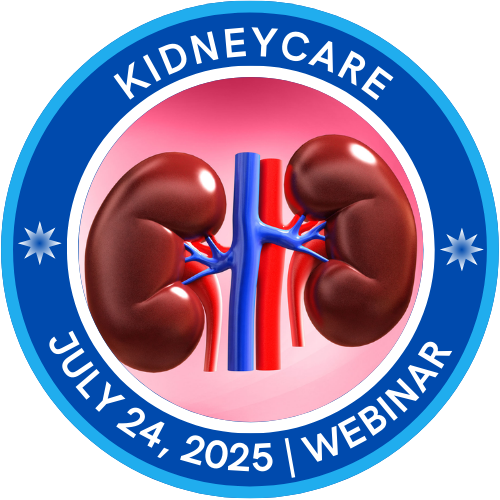Join us on JULY 24, 2025, for the Kidney Care Innovations Webinar, a premier event bringing together nephrologists, researchers, healthcare professionals, and industry leaders to explore the latest advancements in kidney health and treatment. This year’s Theme, "Revolutionizing Kidney Care: Innovations and Holistic Approaches," will delve into ground-breaking research on chronic kidney disease (CKD), dialysis innovations, transplantation breakthroughs, and the integration of AI in nephrology. Experts will discuss preventive strategies, personalized treatment approaches, and the role of nutrition and lifestyle in kidney health. Engage with global specialists, discover cutting-edge therapies, and be part of the conversation shaping the future of kidney care. Don't miss this opportunity to advance your knowledge and contribute to the evolution of renal healthcare!
Kidney care is a vital and rapidly evolving field that plays a crucial role in maintainin overall health and well-being. The kidneys, essential organs responsible for filtering waste,balancing electrolytes, and regulating blood pressure, are vulnerable to a wide range of conditions, from chronic kidney disease (CKD) and acute kidney injury (AKI) to genetic disorders and kidney failure. With the rising prevalence of kidney-related ailmentsworldwide, advancements in nephrology are transforming the diagnosis, treatment, andprevention of kidney diseases. Recent breakthroughs in renal research, including artificial kidneys, regenerative medicine and biomarker-driven diagnostics, are revolutionizing kidney care. Innovations such asprecision medicine, wearable dialysis devices, and AI-powered predictive analytics areenhancing early detection and personalized treatment strategies. Additionally, stem celltherapies and bioengineered kidney tissues hold promise for addressing organ shortages andimproving transplantation success rate.

The kidney care market is experiencing significant growth, driven by the increasing prevalence of chronic kidney disease (CKD), diabetes, and hypertension. The global dialysis market, a major segment of kidney care, was valued at $91.2 billion in 2020 and is projected to reach approximately $129.8 billion by 2028, growing at a compound annual growth rate (CAGR) of 4.7% during this period. Allied Market ResearchIn the United States, the dialysis market was valued at $26.55 billion in 2023 and is expected to reach $39.69 billion by 2033, with a CAGR of 4.1%. This growth is attributed to factors such as the increasing number of end-stage renal disease (ESRD) patients and advancements in dialysis technology.